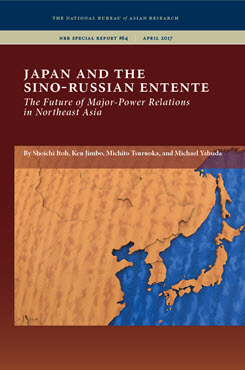Japan and the Sino-Russian Strategic Partnership
This essay evaluates the strengths and weaknesses of the Sino-Russian strategic partnership in light of the crisis in Ukraine and examines the recent failed attempts by Japan to resolve its long-standing differences with Russia.
EXECUTIVE SUMMARY
MAIN ARGUMENT
President Vladimir Putin’s intensified outreach to China in mid-2014 to mitigate the disastrous economic effects of Western sanctions following both the Ukraine crisis and the steep drop in oil and gas prices has not met Russia’s economic needs. Instead, the two big Eurasian powers have found that their strategic partnership is more important, even if still limited, in the diplomatic, political, and military realms than in the economic realm, where their interests were supposed to be the most complementary. In this context, Prime Minister Shinzo Abe attempted to establish a rapprochement with Russia after 70 years of stalemate over the disputed Kuril Islands/Northern Territories. Abe proposed to Putin that Japan would first help modernize the Russian Far East and then negotiate afresh over the islands. In the end, however, Putin refused this compromise, demonstrating the priority of the enhanced relationship with China.
POLICY IMPLICATIONS
- Abe’s initiative to modernize the economy of the Russian Far East with a view ultimately to reaching a peace treaty over the disputed Kuril Islands/Northern Territories could open the way for Russia to reach out to the vibrant economies of the Indo-Pacific.
- If Russian-U.S. relations improve during the Trump administration, such a development would weaken the Sino-Russian partnership and would be a geopolitical setback for China in the region, which would be to the advantage of the U.S. and its allies.
- The U.S. should recognize the leverage it possesses over the geopolitical choices available to these major powers. The sanctions imposed on Russia made its turn to the East an act of necessity rather than a matter of choice, while U.S. dominance of the international financial system limited the capacity of Chinese and Japanese banks to invest in or to extend loans to Russia. To be even more effective, the U.S. should use such leverage together with the European Union and Britain.


